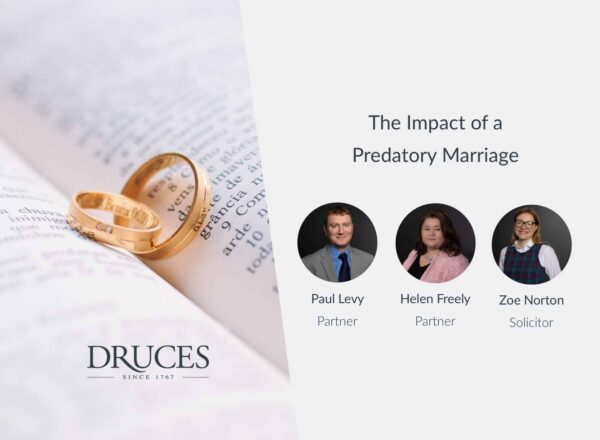The Contentious Probate Team at Druces recently successfully represented the son of an elderly man, who died following a predatory marriage to his carer, in a contested estate dispute with the spouse.
Our client and his father hired a carer some ten years ago to assist the father as he was suffering from dementia and other age-related illnesses. The carer later qualified as a nurse in the UK. Initially, the arrangement seemed to work well. However, fast-forward to a few years ago and the father and carer had married in secret, despite many attempts by our client and his children to prevent such a marriage. At the time of the marriage, there was around a 40-year age gap between the father and his carer; the father was suffering from severe dementia, often acting irrationally and aggressively towards his friends and family.
Sadly, our client’s father died. The carer, now the father’s spouse, had failed to care for him properly and keep him safe and protected. The father went wandering around the streets in the early evening on one of the hottest days of the year and tragically died. At no point did the carer-spouse seek to prevent him leaving his home, nor did she even bother to go and search for him. Following the father’s death, it became clear the carer-spouse had not been caring for the father in the manner expected of a loving wife, and certainly not of a trained nurse with experience of geriatric patients. It came to light she had even left our client’s father alone whilst she worked twelve-hour shifts at the local hospital, surveying him from a distance with security cameras.
Prior to his marriage to the carer, the father had a Will leaving his entire estate to his sole surviving son. However, due to the marriage, the Will was revoked and a subsequent Will was never made. The rules of intestacy were to apply, meaning the carer-spouse stood to inherit over 50% of the estate, equivalent to nearly £1,000,000. The son would still inherit some of the estate, but significantly less than under the original Will.
The son therefore sought our representation to avoid his father’s spouse inheriting anything on the basis that the marriage was a predatory marriage and she had contributed to his father’s death. The marriage had some stand-out characteristics of a predatory marriage, namely a significant age gap, one of the spouses being vulnerable and lacking mental capacity, wealth inequalities between the spouses. However, the law on predatory marriage in England and Wales is in its infancy and once one of the spouses has died, the marriage cannot be annulled. The intestacy position stood.
The matter was resolved at a mediation, and we successfully secured our client a substantial tax-free sum. Whilst the carer-spouse will still inherit some of the estate, it was less than if intestacy laws had been followed absolutely. Owing to the current law, there was nothing that could be done to ensure the spouse received nothing at all.
This case raises a number of public policy questions, not least whether the law on marriage and intestacy should be reformed and considered as interlinked, rather than separate spheres. The irony in this matter being that whilst the father was deemed to have sufficient mental capacity to marry, he would unlikely have had sufficient capacity to change his Will, despite the impact marriage has on a Will.
If this story sounds familiar to your own situation, please do not hesitate to contact a member of the Contentious Probate Team to discuss the options available to you and your family.








